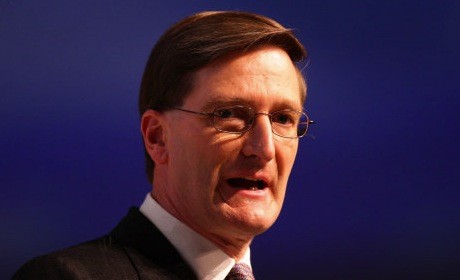
The attorney general Dominic Grieve, who reitereated his commitment to enforcing contempt of court laws during a speech to students in London
Credit: Dave Thompson/PAThe attorney general has warned journalists against assuming that they are free to report what is said in parliament without fear of bring prosecuted.
Speaking at City University, London on the issue of contempt of court, Dominic Grieve pointed out that the parliamentary papers act, which chiefly protects the parliamentary record Hansard, "does not necessarily extend to all publications which are not published by order of parliament".
He acknowledged that journalists are protected by qualified privilege in producing a "a fair and accurate report of proceedings", but warned that "just because something has been said does not mean it can be repeated out of context".
"This question has yet to be authoritatively decided but will shortly be considered further by parliament. But in the interim - writer beware".
Grieve's comments follow controversy earlier this year over the coverage of parliamentary debates on privacy injunctions. Under the absolute privilege afforded to MPs speaking in parliament, certain politicians revealed the identities of public figures that were protected by injunctions.
Grieve criticised those who had taken advantage of privilege to break injunctions, stating that it "ill serves the parliamentary process if court orders are openly flouted for no good reason".
He also criticised the British press, which he said had been "pushing at the boundaries" of what it could get away with under contempt of court laws and "subtly seeking to explore what is and isn't acceptable".
Grieve has initiated four contempt proceedings against the press in his 18 months in office – more than his predecessors did in 10 years. He has successfully prosecuted the Daily Mail, the Sun (twice), and the Daily Mirror, and is also currently pursuing contempt actions against Sky News and the Spectator.
He called the coverage of the arrest of Chris Jefferies – over which he was forced to issue an advisory note to all newspapers and later prosecuted the Sun and the Daily Mirror – "highly prejudicial", and suggested that beyond the legal concern there was a "moral imperative – the need to observe common decency when reporting on such cases".
He was concerned, he added, that "uncontrolled, such reporting could eventually undermine the jury system".
But, he said, he did not "seek confrontation" with the press and had "no desire to act as a policeman".
"I hope in the months to come I can act with and not against the press. These are difficult times for the media and I am aware of this. The pressure to maintain circulation, to beat competitors and to capture the attention of the reader – has never been greater.
"The inexorable rise of the internet and the citizen journalist present us all with challenges for the future. We must work together to ensure that the highest professional standards are met at the same time as press freedom."
Despite his concerns over the failure of newspapers to properly adhere to contempt regulations, Grieve indicated his support for self-regulation and for the Press Complaint Commission. He acknowledged that the much-maligned regulator, which has been roundly criticised at the Leveson inquiry over the past few weeks, had "an unenviable task", but said that he wanted "to continue to engage" with the body, adding: "and if it can work effectively then I would be happy to see it do so".
Free daily newsletter
If you like our news and feature articles, you can sign up to receive our free daily (Mon-Fri) email newsletter (mobile friendly).
Related articles
- Parliamentary committee calls for tougher action against SLAPPs
- 'Give Ofcom the power to demand Facebook to explain its algorithms', Full Fact urges UK parliament
- UK parliament told the media needs greater covid-19 data transparency
- 'Platforms should pay for news' a peer committee says
- Have your say in the new inquiry on the future of journalism









